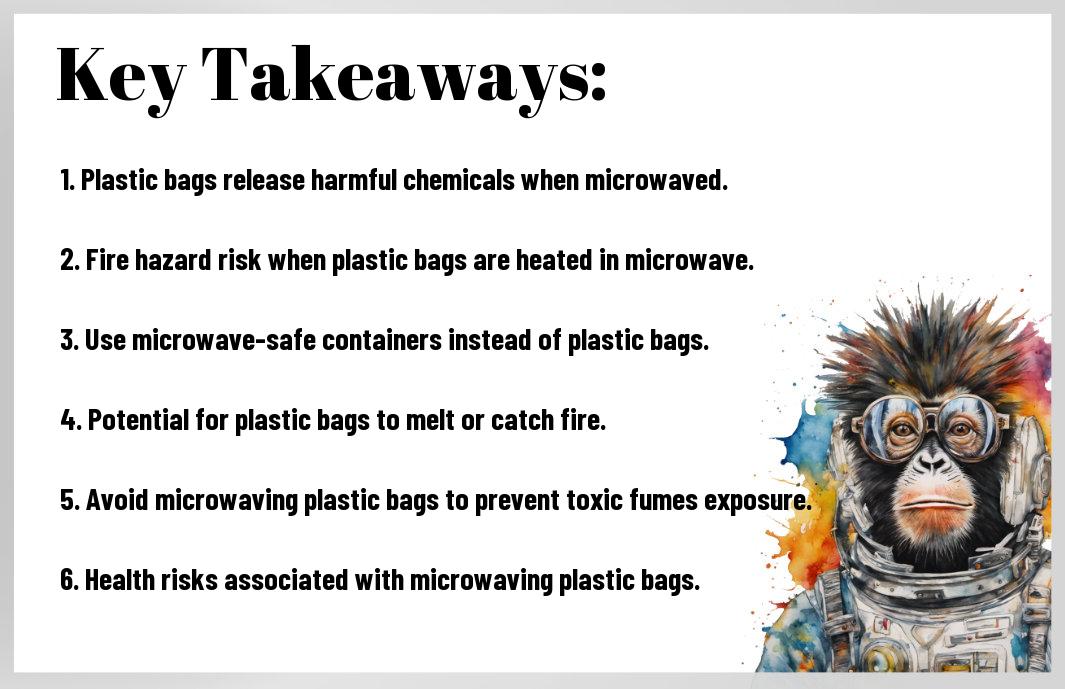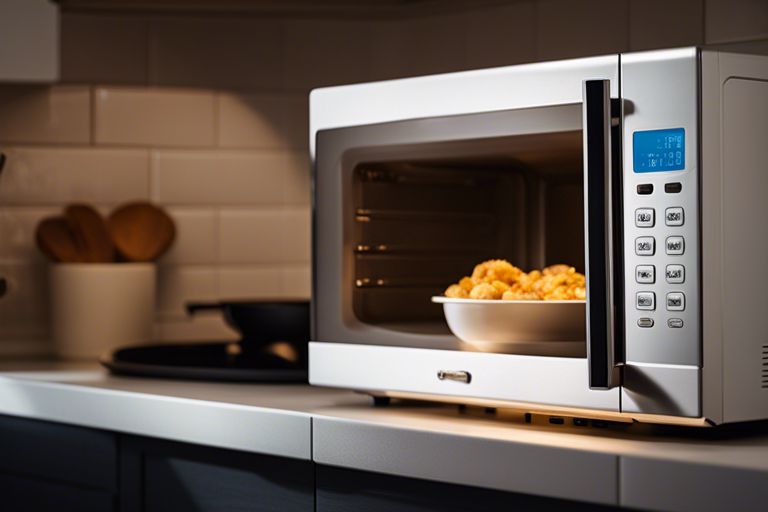Over the years, there has been a debate about whether it’s safe to put plastic bags in the microwave. In this informative post, we will explore the potential risks associated with microwaving plastic bags and provide you with the necessary information to make an informed decision. Let’s probe into the science behind this common kitchen conundrum and uncover the facts you need to know.
Key Takeaways:
- Absolutely Not: Microwaving plastic bags is a big no-no as it can release toxins into your food. These toxins can be harmful to your health and may cause serious health problems over time.
- Opt for Microwave-Safe Containers: Instead of plastic bags, choose microwave-safe containers made of glass or ceramic. These containers are designed to withstand the heat from the microwave without releasing harmful chemicals into your food.
- Reduce Plastic Use: Consider using eco-friendly alternatives like reusable silicone bags or beeswax wraps to store and heat up your food. These alternatives are not only safer for your health but also better for the environment.

The Dangers of Microwaving Plastic Bags
While the convenience of using plastic bags in the microwave may be tempting, it is crucial to understand the potential dangers associated with this practice. Microwaving plastic bags can lead to chemical leaching and the release of toxic fumes, posing serious risks to your health and safety.
Chemical Leaching
The act of microwaving plastic bags can cause chemicals from the bag to leach into your food. When exposed to high temperatures, plastic bags can break down and release harmful substances such as BPA (bisphenol A) and phthalates. These chemicals are known to be endocrine disruptors and have been linked to various health issues, including hormonal imbalances and reproductive problems.
Toxic Fumes
Plastic bags are not designed to withstand the high temperatures of a microwave, leading to the potential release of toxic fumes when heated. These fumes can contain harmful chemicals that, when inhaled, may cause respiratory issues, nausea, headaches, and dizziness. It is crucial to avoid exposing plastic bags to heat sources like microwaves to prevent the release of these toxic fumes into your home environment.
Avoid risking your health by microwaving plastic bags, as the consequences of chemical leaching and toxic fumes can have lasting impacts on your well-being. It is always best to use microwave-safe containers made of glass or ceramic to heat your food safely without putting your health at risk.

What Happens When You Microwave Plastic Bags
Thermal Degradation
Anytime you microwave plastic bags, there is a risk of thermal degradation occurring. When plastic bags are exposed to high temperatures in the microwave, they can break down and release harmful chemicals into your food. This can not only affect the taste of your food but also pose potential health risks.
Molecular Breakdown
Happens Over time, the molecular structure of the plastic in the bags can break down due to the heat from the microwave. This breakdown can lead to the release of harmful compounds like phthalates and BPA, which are known to have negative health effects. It’s necessary to be cautious when microwaving plastic bags to avoid these risks.
Degradation The molecular breakdown of plastic bags can be accelerated when exposed to heat, especially in the microwave. The combination of high temperatures and plastic materials can lead to the release of toxins that may leach into your food, presenting potential health hazards.
This highlights the importance of using microwave-safe containers and avoiding microwaving plastic bags whenever possible. Being mindful of the materials you use in the microwave can help protect both your health and the environment in the long run.
Types of Plastic Bags and Their Microwave Safety
Your choice of plastic bags can impact their safety in the microwave. Different types of plastic have varying heat resistance levels, making some suitable for microwave use while others are not. Recognizing the type of plastic bags you have can help you determine if they are microwave-safe.
| Plastic Bag Type | Microwave Safety |
|---|---|
| Polyethylene Bags | Safe for microwave use |
| Polypropylene Bags | Safe for microwave use |
| Biodegradable Bags | Not microwave-safe |
| Compostable Bags | Not microwave-safe |
| Reusable Plastic Bags | Check manufacturer guidelines |
Polyethylene and Polypropylene Bags
The most common plastic bags, polyethylene, and polypropylene, are generally safe for use in the microwave. These bags have a higher heat resistance compared to other types of plastic, making them suitable for heating food. However, it’s important to follow the manufacturer’s guidelines and avoid overheating to prevent any potential risks.
Biodegradable and Compostable Bags
Biodegradable and compostable bags are typically made from plant-based materials and are not designed for microwave use. These bags may contain additives that can leach into food when exposed to heat, making them unsafe for microwave heating. It’s best to transfer food to a microwave-safe container before heating to avoid any contamination risks.
Plus, biodegradable and compostable bags require specific conditions to break down properly, and exposure to high heat in the microwave can alter their composition, affecting their ability to decompose efficiently.
Reusable Plastic Bags
Polyethylene or polypropylene reusable plastic bags are a popular choice for sustainability-conscious individuals. While some reusable bags are microwave-safe, it’s necessary to check the manufacturer’s guidelines before using them in the microwave. Some reusable bags may have metal components or other features that make them unsuitable for microwave heating.
Biodegradable and compostable bags are attractive options for eco-friendly consumers, but they are not suitable for microwave use due to their composition and additives that can leach into food when heated.
Safe Alternatives to Microwaving Plastic Bags
Glass Containers
For a safe alternative to microwaving plastic bags, consider using glass containers. Glass is a non-toxic, inert material that does not leach harmful chemicals into your food when heated. Glass containers are microwave-safe and can be used to reheat leftovers or store food without any concerns about chemical contamination.
Furthermore, glass containers are durable, easy to clean, and can be used in the oven, microwave, dishwasher, and freezer, making them a versatile option for food storage and reheating.
Microwave-Safe Plastics
On the other hand, if you prefer using plastic containers, opt for microwave-safe plastics that are labeled as such. These plastics are designed to withstand high temperatures without releasing harmful chemicals into your food. Look for containers marked with the microwave-safe symbol to ensure they are suitable for reheating food in the microwave.
It is important to follow the manufacturer’s instructions when using microwave-safe plastics to ensure they remain safe for use when heating food.
Paper Products
Alternatives to plastic bags for microwaving include paper products like parchment paper or wax paper. These can be used to cover food when reheating in the microwave, preventing splatters and keeping your food moist without the risk of chemicals leaching into your meals.
Products like paper plates or bowls can also be used as a safe alternative for heating food in the microwave, providing a convenient and eco-friendly option for quick meals or snacks.
Microwaving with paper products is a safer alternative to plastic bags, as they do not release harmful chemicals when heated and can be disposed of easily after use, reducing environmental impact.
Debunking Common Myths About Microwaving Plastic Bags
The “It’s Okay in Small Amounts” Myth
To address the common misconception that microwaving plastic bags is safe as long as it’s done in small amounts, it is necessary to understand that the issue is not just about quantity. While it is true that some plastics are designed to be microwave-safe, it’s crucial to note that heating plastic can lead to the release of harmful chemicals, regardless of the amount. Putting any type of plastic bag in the microwave can pose risks to both your health and the environment.
The “It’s Only for a Few Seconds” Myth
Despite the belief that microwaving plastic bags for only a few seconds is harmless, the reality is that even short exposure to heat can cause chemicals to leach into your food. Research has shown that when plastic is heated, it can release toxic substances into food, especially fatty foods, and liquids like oils and sauces. These chemicals can have adverse effects on your health, making it important to avoid microwaving any type of plastic bag, regardless of the duration.
Plus, it’s crucial to consider that plastic bags are not designed to withstand heat from microwaves, leading to the risk of them melting, warping, or causing a mess inside the appliance. It’s best to opt for microwave-safe containers or coverings made from glass or ceramic to ensure the safety of your food and health.
The Environmental Impact of Microwaving Plastic Bags
Despite the convenience that microwaving plastic bags may offer, there are significant environmental concerns associated with this practice. From plastic waste and pollution to the generation of harmful microplastics, the impact on the environment can be severe.
Plastic Waste and Pollution
Environmental experts warn about the consequences of microwaving plastic bags, as it can contribute to the already alarming levels of plastic waste and pollution in our environment. When plastic bags are heated in the microwave, they can release toxins and chemicals into the air, further adding to the pollution crisis.
Microplastics and Their Effects
Plastic bags, when exposed to heat in the microwave, have the potential to break down into tiny particles known as microplastics. These microplastics can find their way into the food being heated, posing a risk to human health when consumed. Additionally, these particles can end up in the environment, contaminating water sources and harming wildlife.
A study conducted by environmental scientists revealed that microwaving plastic bags led to a significant increase in the levels of microplastics released. This highlights the need for more sustainable practices when it comes to using plastic materials in food preparation.
To wrap up
With these considerations in mind, it is clear that putting plastic bags in the microwave is not safe. The potential health risks associated with the chemicals that can leach out of the plastic and into your food are not worth the convenience of heating up your meal a few seconds faster. It is always best to err on the side of caution and stick to using microwave-safe containers for reheating food instead of risking exposure to harmful toxins. Be mindful of, safety should always be a top priority when it comes to food preparation.
FAQ
Q: Can you put plastic bags in the microwave?
A: It is not recommended to put plastic bags in the microwave unless they are labeled as microwave-safe. Heating plastic bags in the microwave can lead to chemicals leaching into your food and potentially harmful effects on your health.
Q: How can you tell if a plastic bag is microwave-safe?
A: Look for the microwave-safe symbol on the plastic bag, which typically looks like a microwave with wavy lines. If the plastic bag is not labeled as microwave-safe, it’s best to transfer the food to a microwave-safe container before heating.
Q: What happens if you microwave a non-microwave-safe plastic bag?
A: Microwaving a non-microwave-safe plastic bag can cause the plastic to melt or release harmful chemicals into your food. It’s important to follow the manufacturer’s instructions and only use containers or bags that are labeled as microwave-safe.
Q: Are there any safe alternatives to using plastic bags in the microwave?
A: Yes, you can use microwave-safe glass or ceramic containers, paper towels, or microwave-safe wax paper as alternatives to plastic bags when heating food in the microwave. These options are safer and do not pose the risk of harmful chemicals leaching into your food.
Q: What are the potential health risks of microwaving plastic bags?
A: Microwaving plastic bags can lead to the release of harmful chemicals such as BPA and phthalates into your food. These chemicals have been linked to various health issues, including hormonal disruptions, cancer, and developmental problems. It’s best to avoid microwaving plastic bags whenever possible to reduce these risks.
